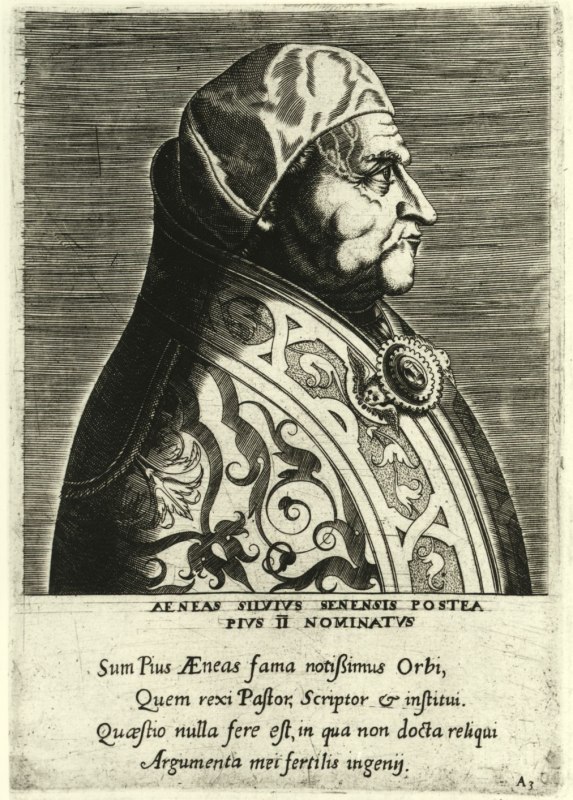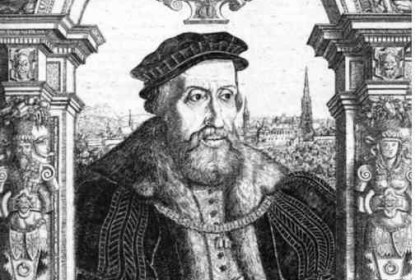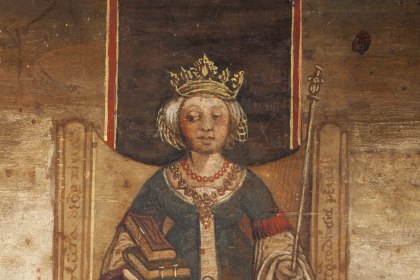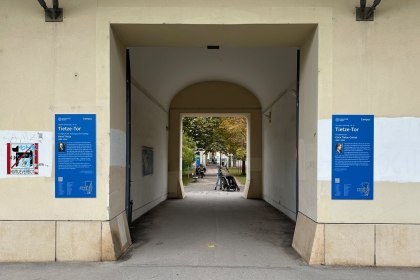Enea Silvio Piccolomini (Papst Pius II.)
Honors
| Ehrung | Titel | Datierung | Fakultät | |
|---|---|---|---|---|
| Gate of Remembrance | Piccolomini-Tor | 1998/99 |
|
- History
- Rhetoric
- Ethnography
- Faculty of Philosophy
Coming from an old impoverished Sienese noble and merchant family, the talented young man received a fine education in Siena and Florence and was one of the outstanding humanists of his time. As a companion of a cardinal, he attended the Council of Basel in 1432, where he soon became an advocate of the increasingly anti-Roman line, "conciliarism", and eventually obtained the position of secretary to the Basel antipope Felix V. On a mission to the Imperial Diet of Frankfurt in 1442, he gained the trust of Frederick III, who awarded him the laurel of the poet for his literary achievements.
In addition, Enea was given a position as secretary in the imperial chancellery, where he now pursued a rapprochement with the Roman Pope, which ultimately led to reconciliation with Rome and the Vienna Concordat (1448), which was to be legally valid until 1803. In recognition of his merits, he became Bishop of Trieste in 1447, Bishop of Siena in 1450 and Cardinal in 1456.
He was finally elected Pope in 1458. Pius II continued to support his former master, Emperor Frederick III, against the opposition of the German princes and doggedly pursued the plan of a crusade against the Turks, who had conquered Constantinople in 1453. Finally, he wanted to lead a crusade personally and put himself at the head of a Venetian fleet, but died suddenly when it arrived in Ancona.
From 1442 to 1455, the scholar was in the service of Frederick III and stayed at the imperial court - therefore mainly in Wiener Neustadt and Vienna. His relationship with the University of Vienna was cool and distant. While the court soon became a center of humanism thanks to Piccolomini, the university was reserved towards the new intellectual movement. Only a few professors, such as Johannes von Peuerbach and Johannes Regiomontanus, publicly taught the humanist studies that the later "humanist pope" propagated in Austria.
In his critical description of Vienna, he criticized the university for its outdated scholastic methods and the exclusive use of commentaries instead of authentic texts. The humanistic subjects of rhetoric and poetics were unknown here. The Viennese students were also far more devoted to "sensual pleasures, eating and drinking" than to scholarship. At the university in 1445, he took part in a solemn disputation of the Faculty of Arts in the presence of Frederick III, Prince Siegmund and numerous noblemen; he had already given a lecture at the Vienna College of Jurists in which he emphasized the value of the "liberal arts" for the moral and spiritual formation of man. In addition to numerous literary, ethnographic and educational works, the "apostle" of humanistic education in Austria left behind important historical works, of which the "History of Austria" (Historia Austrialis) is particularly noteworthy.
He was honored in 1998 by the naming of one of the "Gates of Remembrance" on the campus of the University of Vienna (Piccolomini Gate, passageway from court 7 to court 8).
Zuletzt aktualisiert am 01/17/24
Related content
-
University reforms under Ferdinand I.
1521–1554
1 Articles
-
Renaissance humanism at the University of Vienna
1450–1550
2 Articles
-
Gates of Remembrance on the Campus of the University of Vienna
1998
-
University reforms under Ferdinand I.
1521–1554 -
Renaissance humanism at the University of Vienna
1450–1550 -
Gates of Remembrance on the Campus of the University of Vienna
1998




